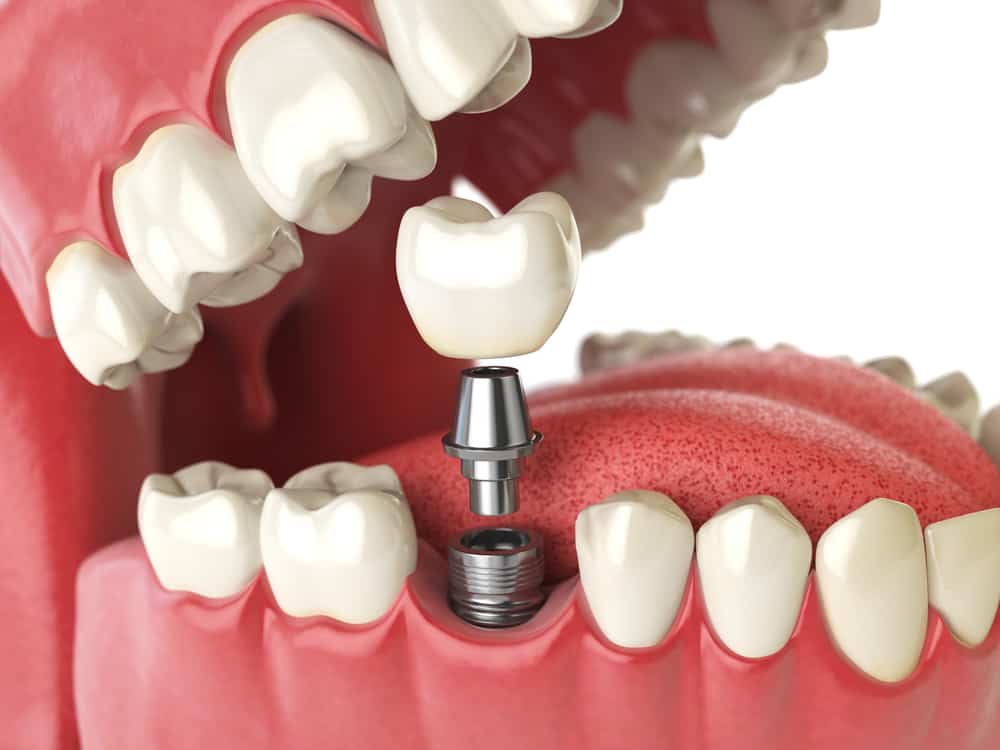Dental implants have become increasingly popular over the last few decades, with more people choosing this route to replace missing teeth. But what exactly are dental implants, and how do they work? In this blog post, we’ll discuss the basics of dental implant technology, its advantages and disadvantages, and different types of materials used to create a successful treatment that helps improve the appearance and function of your Smile. We will also cover the potential risks of getting a dental implant and the considerations you should consider before investing. Whether you’re already considering this option or just curious about it- reading on might help you understand what is at stake when undertaking such an expensive operation.
Definition of Dental Implant
A dental implant is a surgical procedure in which titanium rods, screws, or posts are implanted into the jaw bone and function as artificial roots for missing teeth. Dental implants are often preferred for replacing missing or lost teeth, as they provide a secure base and lasting solution that provides natural-looking aesthetics and stability. The success of dental implants depends on proper surgical placement and bone growth around the implant to create a strong bond with the jaw bone. By consulting with an experienced dentist, patients can determine if they are eligible for dental implant surgery before making any important decisions related to oral health care.
Benefits of Dental Implants
Dental implants offer a permanent solution for lost or damaged teeth. As they are integrated into the jawbone and gums, they can often last much longer than other restoration options. In addition to their functional benefits, such as restoring chewing ability, dental implants can also provide aesthetic enhancements. The Smile will appear natural and healthy by replacing an affected tooth with a lifelike artificial one. Furthermore, when performed by a skilled implant dentist such as those at our practice, patients can benefit from improved speech and less facial displacement caused by missing teeth. Dental implants provide powerful benefits that make them ideal for improving oral health and aesthetics.
Types of Dental Implants
Dental implants are a popular choice among those seeking to restore their smiles. They provide a secure and permanent anchor for false teeth, bridges, or other dental restoration appliances. These prosthetics can be made of different materials, including titanium alloy and zirconia. Titanium alloy implants are long-lasting and have become the standard in the industry; however, zirconia provides a strong anchor that is less likely to trigger allergic reactions than other materials. The choice of material used affects the implant procedure used and should be discussed thoroughly with your dentist so you can select the option that best fits your Smile needs.
Procedure for Getting a Dental Implant
Typically, the process for getting a dental implant is quick and straightforward. The first step involves a consultation with a dentist or oral surgeon who can assess whether you are an ideal candidate for implant installation. Once they provide the green light, they will give instructions on how to prepare before surgery. On the day of surgery, they will take X-rays, administer local anesthesia and insert the implant into place, followed by closure with sutures in your gums. A healing period of around 3-6 months is required while your jawbone fuses with the metal post attached to the implant to ensure its secure attachment to your jawbone and gum line. After that period, you may need adjustments or final shaping at a follow-up visit before receiving a restoration (artificial teeth) attached to it – typically only requiring one more visit. With proper care, dental implants can last throughout your lifetime!
Risks Associated with Dental Implants
They are generally considered safe and reliable, and their success is highly dependent upon proper maintenance and upkeep. As with any oral procedure, there are potential risks associated with dental implants, including infections, nerve damage resulting in pain or a change of sensation in the affected area, implant failure due to poor positioning or poor quality materials, and peri-implantitis, which is an infection of gum tissue around the implant sites. Therefore, it is important to consult a qualified dentist if considering dental implants. They can assess whether or not you are a good candidate for the surgery and discuss preventive measures that help keep dental implants healthy over time (e.g., regular brushing and flossing).
Dental Implant at Winston Hills, NSW, Australia
Looking for a reliable and effective solution for missing teeth? Look no further than Winston Hills Family Dental Care! Our expert dentists in Winston Hills offer dental implant procedures that involve placing an artificial tooth root into your jaw, providing a strong foundation for a replacement tooth or bridge. Dental implants are ideal for individuals who have lost teeth due to periodontal disease.
With dental implants, you can enjoy a variety of benefits, including enhanced appearance, improved speech, increased comfort, better oral health, easier eating, and greater self-confidence—trust Winston Hills Family Dental Care to restore your smile and give you the confidence you deserve.

